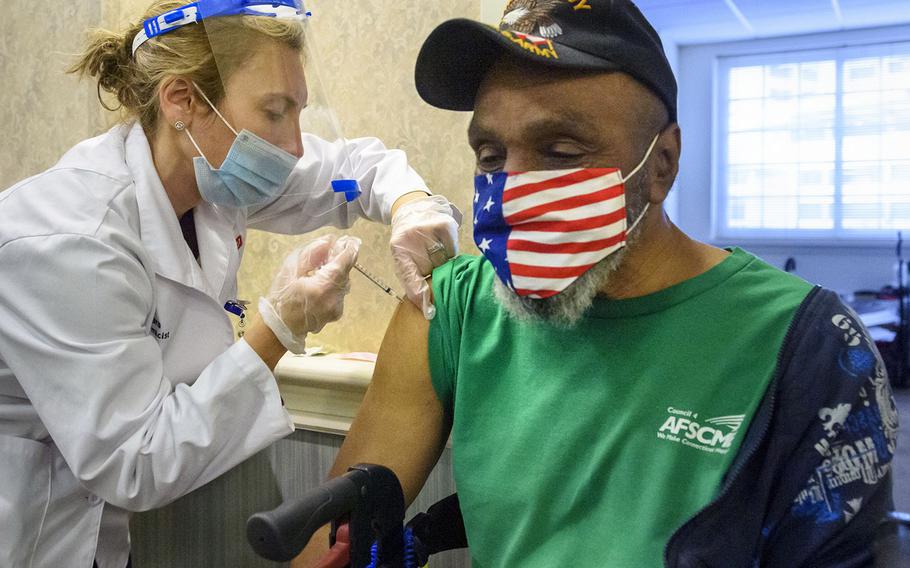
In a Feb. 4, 2021 photo, pharmacist Tara Hubbard delivers a COVID-19 vaccination to Alric Johnson, an Army veteran and resident at The Retreat, a Community Renewal Team assisted-living facility in Connecticut. (Mark Mirko/The Hartford Courant)
Stars and Stripes is making stories on the coronavirus pandemic available free of charge. See more staff and wire stories here. Sign up for our daily coronavirus newsletter here. Please support our journalism with a subscription.
WASHINGTON – Black veterans who are eligible for coronavirus vaccines are accepting them at rates similar to veterans of other races, according to the Department of Veterans Affairs.
The department is working to track vaccine hesitancy as it works to vaccinate millions of veterans across the country. The data doesn’t show more reluctance for the vaccine among Black veterans — unlike the overall Black population in America.
“There’s less hesitancy among Black veterans than we feared,” VA Secretary Denis McDonough said on a call with reporters.
According to a study by the nonprofit Kaiser Family Foundation, one-third of Black adults in the United States said they didn’t plan to get vaccinated. The nonprofit cited barriers for the Black population, including ongoing racism and a legacy of mistreatment by the medical system.
As of last week, the VA was prioritizing vaccinations for veterans over age 75. About 25% of white VA patients over 75 had received coronavirus vaccines, while 28% of Hispanic veterans and 30% of Black veterans had received them, said Dr. Richard Stone, acting undersecretary for health.
The VA credits lack of hesitancy to the department’s outreach efforts. Before coronavirus vaccines became available, the VA held focus groups with veterans of color to determine what they needed to know before making the decision to be vaccinated, said Dr. Jane Kim, who leads the vaccine rollout at the department. Kim testified about the issue Wednesday before the Senate Veterans’ Affairs Committee.
“They told us they wanted the science,” Kim said. “They wanted to know it was safe and effective, and they wanted to talk to someone they trusted on their health care team.”
After vaccines were approved for emergency use, VA health care providers called their patients at highest risk for the virus and answered questions, Kim said.
“There’s no substitute for calling somebody and having a conversation with them,” she said. “I heard many stories from around the VA about how clinicians were getting on the phone, talking to their veterans and helping them make those decisions.”
While the department isn’t seeing differences in vaccine hesitancy based on race, there is some indication that veterans in rural areas are more reluctant to receive it. Rural veterans have been vaccinated at lower rates than veterans in urban places. The VA is unsure whether rural veterans are hesitant to receive vaccines or if they’re facing barriers traveling to VA facilities where vaccines are available.
Stone described getting vaccinations to rural areas as a “tough, herculean effort.” In a few cases, the department has flown vaccines on small aircraft into rural areas in Montana and Alaska. The VA is also working to send mobile vaccination units to places of the country that are far from VA facilities. McDonough said last week the mobile units were “just spinning up” and might be ready in the next couple of weeks.
“We want to be sure veterans know we’re trying to get out to them,” McDonough said.
As of Monday, the department had vaccinated more than 2.3 million people with the Moderna and Pfizer vaccines. Of those, about 818,000 had received both doses. Nearly 10,500 VA patients and 131 employees have died of the virus.
Wentling.nikki@stripes.com Twitter: @nikkiwentling